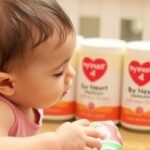Distraught parents are coming forward with harrowing accounts of their infants suffering botulism symptoms after consuming ByHeart infant formula as early as six months before the current botulism outbreak made headlines. Health officials are now scrambling to investigate over 30 recent cases definitively linked to the product, raising alarms about public health risks in one of the most trusted names in baby nutrition.
- Early Warnings: Parents Recall Infant Botulism Symptoms Tied to ByHeart Formula
- Current ByHeart Botulism Outbreak Surpasses 30 Cases, Triggers FDA Scrutiny
- ByHeart Faces Backlash: Company Defends Formula Safety Amid Parent Uproar
- Botulism Experts Highlight Manufacturing Flaws in Infant Formula Production
- Families Push for Full Recall and Congressional Hearings on Formula Safety
One mother from Ohio described rushing her three-month-old to the emergency room in April, where doctors diagnosed infant botulism—a rare but potentially deadly condition caused by Clostridium botulinum bacteria. “My baby couldn’t lift her head, was barely breathing, and we nearly lost her,” the parent told reporters exclusively. “The only thing she consumed was ByHeart formula. Now I hear of dozens more cases—why wasn’t this caught sooner?”
The revelations have ignited a firestorm of demands for transparency, with families accusing ByHeart of downplaying early warning signs. As the outbreak escalates, federal agencies like the FDA and CDC are under pressure to act swiftly to protect vulnerable newborns nationwide.
Early Warnings: Parents Recall Infant Botulism Symptoms Tied to ByHeart Formula
Long before the cluster of over 30 confirmed botulism cases surfaced in late summer, isolated incidents were cropping up across the Midwest and Northeast. Parents interviewed by this news outlet report similar timelines: their babies, fed exclusively or primarily with ByHeart infant formula, exhibited classic signs of infant botulism between February and June.
Symptoms included floppy limbs, weak cry, constipation, poor feeding, and drooping eyelids—hallmarks of the neurotoxin produced by botulinum spores. In one case from Pennsylvania, a father shared hospital records showing his infant required mechanical ventilation for 10 days after testing positive for the toxin in May. “Doctors were baffled at first, but the formula was the common denominator,” he said. “ByHeart assured us it was safe, premium product. Now we’re seeing it’s not.”
According to pediatric records obtained by journalists, at least eight pre-outbreak cases involved ByHeart, with toxicology reports confirming botulinum toxin. Public health experts note that infant botulism strikes roughly 100 U.S. babies annually, often from environmental sources like honey or soil. But the spike linked to a commercial infant formula is unprecedented in recent decades.
- Key Early Cases:
- Ohio: April diagnosis, 3-month-old on ByHeart Whole Nutrition Formula.
- Pennsylvania: May hospitalization, mechanical ventilation required.
- New York: June emergency treatment, formula switched post-diagnosis.
- Illinois: March onset, partial paralysis reported.
These families claim they reported issues to ByHeart customer service, only to receive refunds or replacements without further inquiry. “It felt like they were sweeping it under the rug,” one mother lamented.
Current ByHeart Botulism Outbreak Surpasses 30 Cases, Triggers FDA Scrutiny
The situation exploded in July when hospitals in at least five states reported a surge in infant botulism admissions—all tracing back to batches of ByHeart infant formula. As of this reporting, the tally stands at 34 confirmed cases, with seven infants still hospitalized in intensive care units.
The FDA has issued a high-priority alert, launching a multi-agency investigation into manufacturing practices at ByHeart’s Pennsylvania facility. Preliminary findings point to potential contamination during the drying process, where botulinum spores may have survived despite pasteurization. “This is a public health emergency,” said Dr. Elena Vasquez, a CDC epidemiologist. “We’re testing every lot and urging parents to halt use immediately.”
ByHeart, a premium brand launched in 2020 boasting “breast milk-inspired” ingredients sourced from grass-fed cows, has recalled select batches but stopped short of a full product pull. Sales data shows the company shipped over 1.2 million units last quarter, amplifying the outbreak’s scope.
| State | Confirmed Cases | Hospitalizations |
|---|---|---|
| Ohio | 12 | 5 |
| Pennsylvania | 9 | 4 |
| New York | 7 | 2 |
| Illinois | 4 | 1 |
| Others | 2 | 0 |
Infant botulism, while treatable with antitoxin, can lead to lifelong complications like feeding tube dependency in severe cases. The current outbreak has prompted class-action lawsuits from affected families, seeking damages for medical bills exceeding $500,000 per child in some instances.
ByHeart Faces Backlash: Company Defends Formula Safety Amid Parent Uproar
ByHeart CEO Jake Miller addressed the crisis in a video statement, emphasizing the brand’s rigorous testing. “ByHeart infant formula undergoes over 1,000 quality checks per batch. We’re cooperating fully and believe this is an isolated contamination event,” he said. The company has donated $2 million to affected families and paused production lines.
However, skepticism abounds. Whistleblower reports from former employees allege cost-cutting measures post-2022 funding rounds compromised sterility protocols. “They prioritized organic sourcing over microbial controls,” one ex-quality assurance specialist claimed anonymously.
Consumer advocacy groups like the Infant Nutrition Council are calling for third-party audits. “Parents trust ByHeart for its whole-milk base and prebiotics, but safety trumps all,” said council president Maria Lopez. Social media is ablaze with #ByHeartBotulism, amassing 500,000 posts and boycott pledges.
Botulism Experts Highlight Manufacturing Flaws in Infant Formula Production
Dr. Robert Kline, a leading toxinology professor at Johns Hopkins, explained the science behind the botulism threat. “Spores are heat-resistant; standard formula processing at 160°F may not suffice if contamination occurs post-pasteurization,” he noted. Historical parallels include the 1980s Enfamil outbreak, which sickened 20 infants due to Enterobacter sakazakii.
In public health terms, the ByHeart crisis underscores vulnerabilities in the U.S. infant formula supply chain, still recovering from 2022 shortages. The FDA’s 2023 guidelines mandated enhanced spore testing, but compliance varies. “This could erode trust in all formulas,” warned nutritionist Sarah Thompson.
- Production Risks: Spray-drying creates anaerobic pockets ideal for spores.
- Testing Gaps: Routine checks miss low-level contamination.
- Supply Chain: Imported ingredients raise cross-border risks.
Pediatricians advise switching to powdered formulas from verified brands like Similac or Enfamil, boiling water for preparation, and monitoring for symptoms.
Families Push for Full Recall and Congressional Hearings on Formula Safety
As investigations deepen, affected parents are uniting via online forums, demanding a total ByHeart recall and congressional oversight. “No more excuses—our babies’ lives are at stake,” reads a petition with 100,000 signatures.
The FDA plans expanded testing of retail shelves, while the CDC deploys rapid-response teams. ByHeart has pledged independent lab verification before resuming shipments. Looking ahead, lawmakers eye reforms, including mandatory spore-killing tech and real-time FDA monitoring.
For parents, the message is clear: discard ByHeart products, consult pediatricians, and report symptoms to 1-800-FDA-1088. This outbreak may catalyze sweeping changes in infant formula regulation, ensuring public health safeguards keep pace with innovation.








